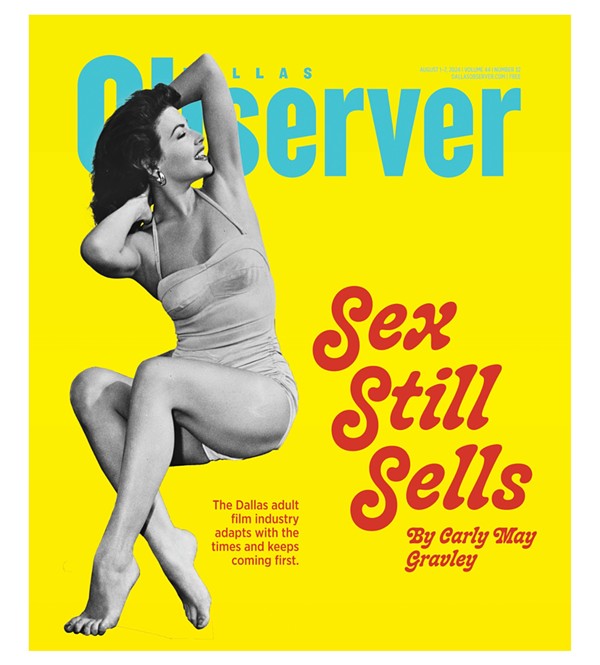Yet this was the case with Denton blues rock power trio The Infamists, whose members were just as shocked as their fans when an album called Death Note appeared on the band's Spotify page in March.
“Every morning when I'm waking up and having my coffee I like to check the band's email, social media and Spotify. It's kind of my morning routine,” vocalist and guitarist Riley Rogers tells the Observer. “I got on our Spotify and there was a new album on our page.”
Rogers’ first assumption was that a band with the same name had uploaded it to their page by mistake. But after listening to the album, Rogers realized there was something more sinister than a common misunderstanding afoot.
“The music just sounded really overproduced and really fake. And the lyrics kind of sounded like something ChatGPT would write.”
The songs didn’t just sound fake. They were barely songs at all, all of them stopping abruptly around the 45-second mark, making it just long enough to earn royalties. It didn’t take long for Rogers to deduce that the entire album was AI-generated.
Rogers explains to us that music is uploaded to streaming services through distributors such as Distro Kid and CD Baby, the latter of which his band works with.
“Your distributor keeps track of your streams for releases you use them for and then they pay you when you hit a certain price point,” he says. “Or they pay you monthly. Or whatever your arrangement is.”
Obviously, the band had no arrangement with whoever distributed the AI-generated album.
The Infamists use CD Baby exclusively, but working with more than one distributor for different projects is possible. Though the band was still earning royalties from their CD Baby distributed music, they wouldn’t have seen any revenue made off the fake album.
“This newer AI record was basically fooling people into thinking we had a new album out and it was kind of like stealing streams from our incoming audience and directing it to that record,” Rogers says. “The streaming royalties are basically being hijacked.”
A friend of Rogers demonstrated to him how modern AI software can generate songs in less than 30 seconds.
“It’s really fast and easy to make AI music,” he says. “And if you can find a distributor that will just upload it for cheap onto Spotify, and they're not a good distributor that does, you know, the vetting they're supposed to do, it’s really not hard to do.”
But why were The Infamists targeted?
“We're a midsize band,” Rogers says. “We don't have a record label. We don't have a bunch of money. We all have day jobs. But we also do pretty decent on Spotify for a local, unsigned band.”
The band has 7,818 monthly listeners on Spotify. Their most popular track, “Death by Misadventure,” has more than 189,000 streams. They’ve also been featured on the Spotify-curated modern blues rock playlist.
Rogers figures they were in that sweet spot between a major artist with a lot of protection from their label and obscure artists with almost no following at all.
“We do just well enough,” he says.
After the AI album dropped, the band spent the following two weeks scouring the internet and social media to see if they had any recourse.
The growing presence of AI in the music industry presents all sorts of legal and ethical questions. Major artists may have more protection than bands like The Infamists, but that doesn’t mean they’re immune from being impersonated.
The voices of stars ranging from Rihanna to Johnny Cash have been used in every scenario from parodies to fantasy covers to spreading disinformation. Even in creations that are upfront about their nature, the resemblance can be uncanny.
Drake is currently under fire for “Taylor Made Freestyle,” a diss track against Kendrick Lamar that uses the AI-generated voices of Snoop Dogg and Tupac Shakur to mock Lamar.
Shakur’s estate has since sent Drake a cease and desist letter.
Amidst all of the uncertainty surrounding AI, The Infamists were fortunate to find several artists who had gone through the same situation, including Ghanaian pop artist Sister Deborah. Though the audio she struggled to have removed was not AI-generated and instead simply lifted from her YouTube page, it caused her similar problems in terms of confusing listeners and leading them away from the authorized version.
“I read on their Twitter that they were going through basically the same thing,” Rogers says. “I asked them how they dealt with it and they sent me a video message back that said, ‘Here's the company that did it. Just keep pestering.’”
Neither The Infamists nor Sister Deborah knows who is behind their unauthorized releases. They’re not even sure that it was the same person or entity. What they did figure out is that they were both uploaded through the same distributor, a Barcelona-based company called SonoSuite.. @sonosuite Takedown Request
— Sister Deborah (@deborahvanessa7) September 9, 2023
I am writing to request the immediate and abrupt takedown of an unauthorized release of Ama Piano by Sister Deborah featuring A.Y Poyoo.
The unauthorized audio is 3 minutes 8 seconds long and was released via Sonosuite S.L on August 30th/Sep 1st,… pic.twitter.com/DEGxQY0p9g
In a tweet seen by 27,000 people, Sister Deborah implored SonoSuite to step up and take down the unauthorized release of one of her songs.
“Kindly and urgently effect this takedown immediately,” the post read. “Do not refer us to the individual platforms like iTunes and Deezer because they have already told us to contact you to take down the songs. Your dubious client has an agreement with you. Not with them.”
When Rogers reached out to SonoSuite about getting the fake Infamists album removed, he was inspired by Sister Deborah’s successful rallying of her social media following.
“Well, here's what's going to happen now,” Rogers says he told them. “I'm gonna use all my resources on TikTok, Instagram, Facebook […] just publicly bring it to everyone's attention and tag that company. Make it a social media war. [...] And then if you don't respond to that, we’ll take legal action.”
Luckily, it didn’t reach that point.
“The next day it was gone,” he says. “I didn't realize how productive it can be to threaten to sue people.”
When it comes to preventing situations like this from happening again, a representative from SonoSuite tells us that the company is “dedicated to upholding and improving music industry standards.”
“Ensuring fairness and safety for all is our priority, and we're committed to maintaining this as technology and the industry evolve,” they say. “We take any comments seriously and continuously improve our processes to prevent them in the future.”
A spokesperson for Spotify tells us that "content providers are responsible for verifying the copyright behind the content they deliver to the platform," and rights-holders can report any infringements through their Spotify for Artists accounts. Last year, the company removed thousands of AI-generated songs that were flagged by Universal Music Group, but will not ban AI content outright.
As for whoever made the album, Rogers has made peace with the fact that he’ll probably never find out. What he does know is that they almost certainly didn’t make any money off this stunt.
“That album was only up for maybe two weeks. And the streaming services don't pay a lot as you well know,” he says. “So I seriously doubt they actually made any money. They basically just caused us a giant headache.”













